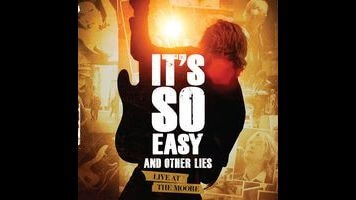The biggest mistake this “musical documentary” makes is assuming watching McKagan read his memoir from a stage works as a framing device. McKagan is a charming and immensely likable presence, but he’s no Spalding Grey, and narrating excerpts of his memoir, with mellow musical accompaniment from his current band Loaded, carries little gravitas and even less cinematic heft. Large chunks of the film are given over to McKagan delivering isolated snippets of his life story, occasionally paired with photos, or brief animated segments à la HBO’s recent Kurt Cobain: Montage Of Heck. Mostly, the camera just returns to the musician onstage, ably lit, recounting his life in the present day. It may have been reasonably entertaining live, but it‘s ill-fitting as a big-screen tactic.
Much of the blame can be laid at the feet of first-time documentary filmmaker Christopher Duddy, a longtime camera operator and cinematographer turned producer, who proves that a career behind the camera doesn’t always prepare someone to helm a movie. (His sole other directing credit, the miserable direct-to-video raunch comedy Cougar Club, does nothing to dispel this suspicion.) Duddy never met a simile he couldn’t render as literally as possible: When McKagan announces something was “like lightning,” you’d better believe the director overlays the screen with repeated bolts of the stuff. To be fair, he’s not helped by McKagan, who has a tendency to indulge in generic clichés and obvious music cues when recounting his tale. Slash reminiscing about an early Guns N’ Roses meeting is paired with Loaded’s instrumental, easy-listening version of “Paradise City”; McKagan’s near-death experience from drugs and alcohol is wedded to a similarly genteel “Knockin’ On Heaven’s Door”; and so on.
The film is too much of a cut-and-paste mess to coast by on the charms of its protagonist. There are errors so basic that it’s hard to believe no one pulled Duddy aside and explained to him the fundamentals of storytelling. Roughly halfway through It’s So Easy, a new monologue from McKagan begins, “On Christmas 1989, I asked her to get out.” Who? Up until that point, there was no indication McKagan was in a long-term relationship, let alone married. The second-chance narrative of starting Velvet Revolver could have made for another interesting tale, but it’s glossed over so quickly in an effort to return to the musician’s journey to sobriety that there’s no arc to the story. Pieces of the larger narrative flit in and out with no momentum or build, usually disappearing before any juicy tidbits arrive.
Even the film’s early going, a sensible effort to flesh out the young man who helped create one of the biggest hard-rock acts in history, flubs the drama. Seeing posters from those small-potato shows is neat, but Duddy depicts it by filming McKagan rifling through his old mementos in real time, like a themed episode of Antiques Roadshow. Time that could be spent hearing specific tales of chaotic life on the road is given over to platitudes about the experience of becoming a parent. There’s also a training montage of McKagan’s workout routine. Don’t Look Back, this is not.
By the time Duddy is ending the film by literally throwing words from motivational posters on the screen—“ALIVE, HOPE, DREAM, LOVE” all come in rapid succession—viewers could be forgiven for wondering why they had bothered with this version of McKagan’s story, when his book contains all the good stuff the film merely teases. The best moments occur when It’s So Easy And Other Lies hands over its narrative to other players: various rock stars reminiscing about hearing Appetite For Destruction for the first time or Slash painting a vivid picture of their life via telling details, such as the vodka-with-a-splash-of-juice cocktail they would make for breakfast every morning for years on end. But these are sparse moments across a bland film, assembled just awkwardly enough to keep from being forgettable. McKagan has a great story and a fascinating life; neither one comes through effectively. Rarely have the words “read the book instead” held more weight.


 Keep scrolling for more great stories from The A.V. Club.
Keep scrolling for more great stories from The A.V. Club.